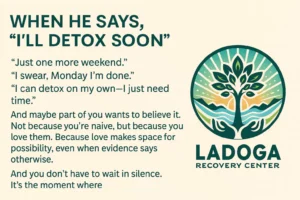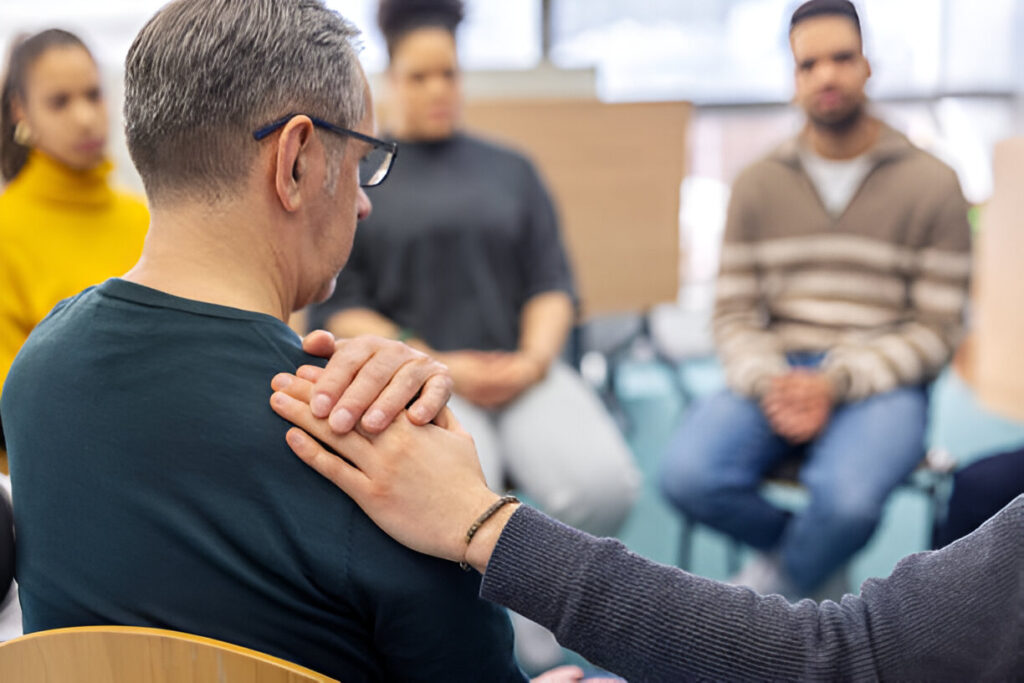You’ve heard it before.
“Just one more weekend.”
“I swear, Monday I’m done.”
“I can detox on my own—I just need time.”
And maybe part of you wants to believe it. Not because you’re naive, but because you love them. Because love makes space for possibility, even when evidence says otherwise.
But now, maybe you’re exhausted.
Or scared.
Or quietly dreading what “after this weekend” might actually mean.
If your partner keeps promising they’ll detox on their own, soon, this blog isn’t here to tell you what to do. It’s here to remind you: You’re not the only one walking this tightrope.
And you don’t have to wait in silence.
Professional detox programs like ours in Ladoga, Indiana were built for exactly this moment—the pause between a promise and a pattern. Let’s walk through what it means, what to say, and how to hold hope without losing yourself in the process.
Why do they always say “after this weekend”?
Because “later” feels safer than now.
It gives them space to believe they still have control. That they’re choosing to stop—not being forced. And because admitting they can’t do this alone often feels like failure.
For someone in active use, the idea of stopping can feel physically, emotionally, and psychologically overwhelming. Saying “not now” becomes a way to soothe everyone—including themselves.
But weekends stretch into weeks. “One more” becomes five. Promises lose weight.
When you gently name that pattern, you interrupt it.
Try:
“I’ve noticed you’ve said this before. Can we talk about what’s making it so hard to start today?”
Is it really unsafe to detox at home?
In many cases, yes.
Detoxing without medical supervision—especially from alcohol, benzodiazepines, or opioids—can lead to serious withdrawal symptoms. Seizures. Heart issues. Hallucinations. And in rare cases, death.
Even if they’ve done it before, the next time isn’t guaranteed to be the same. The risks stack. And the suffering compounds.
Medical detox isn’t about making things easier because they’re weak. It’s about making things safer because withdrawal is a real, dangerous process—not just a bad weekend.
Ladoga Recovery Center’s detox program provides 24/7 care to help people stabilize—not suffer.

What should I say when they swear they’ve “got it”?
Start with connection, not correction.
Try:
“I know you want to do this your way. I also know I’ve watched you suffer. Can we talk about what support might actually look like?”
This keeps the conversation open. No accusations. No ultimatums. Just truth.
You can validate their desire to stop and be honest about what you’ve seen. You’re not saying you don’t believe them. You’re saying you care too much to watch them do it the hardest way possible.
But what if I’m scared to push them?
You’re not alone.
Many partners worry that pushing too hard will backfire. That it will create distance. Or push them back into denial. But there’s a difference between pushing and naming what’s real.
You don’t have to make threats to set boundaries. You don’t have to yell to be heard.
Sometimes the most powerful thing you can say is:
“I love you. I’m not angry. I’m scared. And I don’t think I can keep pretending this is okay.”
That’s not an attack. That’s a lifeline.
How can I offer detox without making it sound like I’m forcing them?
Make it about relief—not rescue.
People in active use often fear judgment. Medical detox can sound cold, impersonal, or humiliating. So change the frame.
Try:
“There’s a place in Ladoga where you can detox safely. You don’t have to white-knuckle it. I can help you call if you’re open to it.”
Offer it as care, not control. As an option, not an ultimatum.
Detox doesn’t erase pain overnight—but it creates the conditions for healing to start. When they see it as an act of self-respect, they’re more likely to say yes.
What if they agree—but then back out?
That’s incredibly common—and incredibly painful.
Maybe they say yes on Saturday and disappear on Sunday. Maybe they ask you to call, then ghost the intake call. Maybe they pack a bag… and never leave the house.
It’s okay to feel crushed. And it’s okay to let them know.
Try this:
“When you said yes, I felt hopeful. When you changed your mind, I felt scared. I’m not mad. I’m just not sure how to keep doing this without hurting myself.”
You’re allowed to have limits. Boundaries don’t mean abandoning them. They mean protecting you.
What if I don’t even know what I want anymore?
That’s not failure. That’s burnout.
Being in love with someone actively using will erode your sense of what’s real. It blurs lines. It wears you down. One day, you’re begging them to stay. The next, you’re googling hotels just to get some peace.
Your needs matter too.
You don’t have to know if you’re staying forever or leaving tomorrow. But you do deserve clarity. Support. Safety.
That’s why it’s okay to reach out even if they won’t. Even if they say they’re fine.
Ladoga Recovery Center can answer your questions—even if your partner isn’t ready to ask them yet.
Detox FAQ for Partners and Spouses
Can I force them into detox?
Legally, in most states, no—unless they are an immediate danger to themselves or others. But even in places with involuntary commitment laws, long-term success depends on willingness. Forced detox without follow-up support rarely leads to lasting recovery.
Is it normal to feel like I’m being manipulated?
Yes. Addiction rewires survival instincts. Your partner may not intend to manipulate—but fear, shame, and craving often lead to broken promises. Naming this doesn’t mean they don’t love you. It means you’re seeing the addiction clearly.
What if they get angry when I bring up detox?
That’s also common. The conversation threatens their current survival system—even if it’s hurting them. Try not to take their reaction personally. Stay calm. Offer space, not lectures.
Should I give them one more chance to do it their way?
Only if you can do it without betraying yourself. Ask: Am I offering this because I truly believe they’re ready—or because I’m scared of setting a limit? Your peace matters too.
How do I talk about detox without sounding like I’m giving up on them?
Make it about belief. About how much you do want them to feel better. You’re not walking away. You’re offering a safer road forward.
Try:
“You deserve support. You deserve to feel steady. I don’t want you to keep suffering when there’s help.”
Final Words: You’re Not Alone in the Waiting
Waiting for someone to choose detox can feel like waiting for a storm to pass—with no idea if the house will still be standing afterward.
But you don’t have to wait in silence. And you don’t have to wait forever.
There is help, even if they’re not ready yet. There are people—like the team at Ladoga Recovery Center—who understand both the one spiraling and the one holding the line.
You’re allowed to be tired. To need answers. To want something different.
Detox isn’t the end of the story. It’s the moment where pain begins to lose its grip—and something softer, quieter, steadier starts to take root.
Ready to offer help they might actually accept?
Call (888) 628-6202 to learn more about our Detox services in Ladoga, Indiana.

